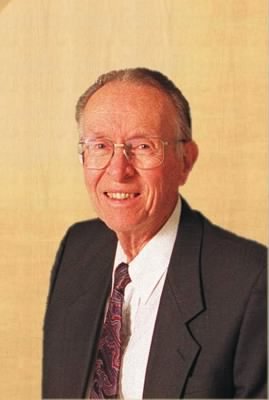H. Tracy Hall: Mormon Scientist
Howard Tracy Hall was a chemist, inventor, and educator. He created a press that enabled him to be the first person to grow a synthetic diamond using a reproducible, verifiable process.
Hall was a chemist with General Electric on December 16, 1954, when he created a synthetic diamond using carbon (the natural source for diamonds) under high pressure. G.E. did not support his early diamond experiments, but the company found many uses for Hall’s synthetic diamonds and made billions. Hall was recognized and rewarded only a $10 savings bond, in addition to his normal salary. He felt disheartened by the lack of credit and support and left G.E. in 1955.
Brigham Young University hired him and he became a professor of chemistry and Director of Research. While at BYU, he continued his high-pressure research. Due to the patent G.E. received from the federal government, Hall was prevented from using the press he created at G.E. Undaunted, he invented the tetrahedral press, which was even better than his first press. He eventually started his own company, Novatek, and was a co-founder of MegaDiamond. The company continues to sell gem-quality diamonds.
He received three patents in the early 1960s: Diamond Synthesis, Method of Making Diamonds (with Herbert M. Strong and Robert H. Wentorf Jr.), and High Pressure Press.
Hall was the only BYU faculty to receive the prestigious Sloan Research Fellowship while a BYU faculty, until 2011 when Jessica Purcell received it. The fellowship is awarded to early-career scientists with the potential to make substantial contributions in their field. In 1972, he was awarded the American Chemical Society Award for Creative Invention. In 1977, the American Physical Society awarded him the James C. McProddy Prize for New Materials. In 1994, he received the Governor’s Medal for Science and Technology.
He spent twenty-six years in teaching and research at BYU. The university awards the H. Tracy Hall Scholarship in his honor. Weber State University created the Tracy Hall Science Center in honor of two families—the Tracy family and the Hall family.
Hall was born on October 20, 1919, in Ogden, Utah. He was raised in Marriott, Utah, and attended Weber College for two years and then earned his bachelor’s degree in 1942 and his master’s in 1943. He was Henry Eyring’s first graduate student and earned his PhD in physical chemistry in 1948. He began working for G.E. two months after his graduation. He passed away on July 25, 2008, in Provo, Utah. He and his wife, Ida-Rose, were the parents of seven children. He was a member of The Church of Jesus Christ of Latter-day Saints. He and his wife served a full-time mission to South Africa.
